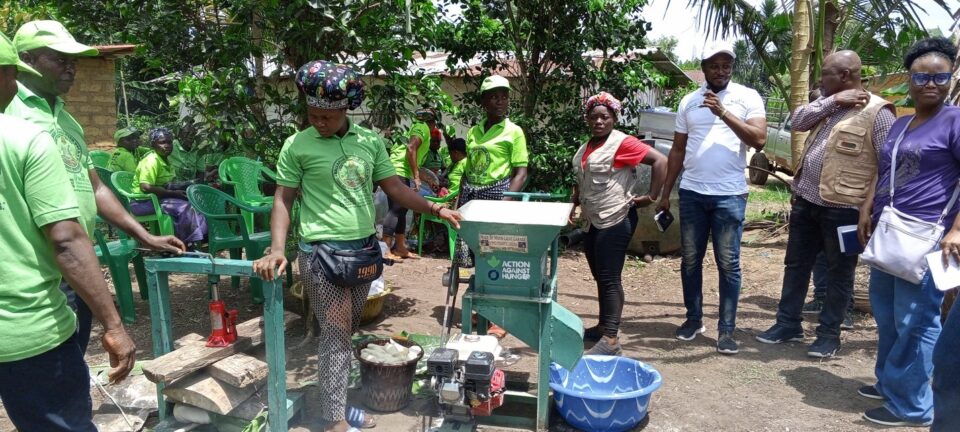PHOTO: Beneficiaries produce gari from a cassava processing mall constructed for them by the WASH Consortium.
By Aaron N.S. Salloe
Malnutrition, which includes wasting, stunting, underweight among others, is undeniably a global health problem. An estimated “149 million children under 5 were estimated to be stunted (too short for age), 45 million were estimated to be wasted (too thin for height), and 37 million were overweight or living with obesity, the World Health Organization(WHO) said in 2022. The WHO said, “nearly half or 3.1 million of deaths among children under 5 years of age are linked to undernutrition.” It added those deaths had occurred in Liberia and other “low- and middle-income countries.”
Malnutrition, a national problem
A report, under the caption “Reducing Chronic Malnutrition Among Children in Liberia” released in June 2024 by Action Contre La Faim, a member of the WASH Consortium said, “37% of deaths in children under five are due to pneumonia or diarrhea, both of which are affected by water, sanitation and hygiene.”
Liberia is still struggling to tackle malnutrition—a major issue affecting 1.5 million children or 30 percent of the country’s population, according to the 2019-2020 Liberia Demographic and Health Survey. Liberia’s population as of 2020 was 5.0 million. The report says, 3 percent of that number suffered from wasting, acute malnutrition, with 11 percent affected by underweight.
The World Bank (March 2024) said poverty has “increased[in Liberia] from 54.1% in 2014 to 58.9% in 2016, driven by the Ebola crisis and the 2015 economic downturn.” But the Liberian Government has claimed progress in tackling malnutrition. Measuring its performance with other countries, it said Liberia was “amongst 21 countries globally which are on track to meet the World Health Assembly (WHA) 2025 targets of 40 percent reduction (WHO, 2020).”
But the Government did acknowledge in the Liberia Multi-Sectoral Nutrition Costed Strategic Plan(LMNCSP 2024-2028, Liberia’s roadmap for tackling malnutrition, that the level of hunger in the country was serious, with “20 percent of households consuming suboptimal diets,” and “20 percent households consuming diets deprived of the most needed nutrients found in animal products, legumes vegetables and fruits.”
Poverty, which fuels hunger, is visible everywhere in Liberia, particularly in rural parts of the country, where the World Bank said it “surged by 11.2 percentage points to reach 81.2 percent” between 2014-2016.
Grand Bassa County has the highest poverty rate in Liberia, an issue that puts a strain on baby mothers like Wayadeh Gueh to raise their children. As with other mothers in the county and other parts of Liberia whose children are affected by malnutrition, Gueh unsurprisingly struggled to raise and provide nutritious meals to her then 4-month-old baby, Effort Gueh.
Effort consumed food with little or no carbohydrates, protein, dietary fiber, and water among other important nutrients, an issue that negatively affected his growth. It worried his mother.
“I never used to sleep, I was worried, but God made it he came through,” said Gueh, a 55-year-old mother of Compound # 1, Grand Bassa County.
Doris L. George, another baby mother, felt the same way about her now healthy 3-year-old son,
Rejoice Koffa. As with little Effort, little Koffa too did not grow up eating food with proper nutrients.
“I was feeling very bad because it almost led to her to death,” said Doris.
Major interventions
A great intervention was made and helped changed the children’s conditions after they became beneficiaries of the “Multi-Sectorial Response to Improve the Nutritional Status of Children Under 5 years project,” which aims to reduce the high stunting rate of children under five in two counties—Grand Bassa and Rural Montserrado. The four-year project in being implemented by the Liberia WASH Consortium (LWC), with funding from Irish Aid. The LWC consists of seven development partners working on public health and WASH priorities in Liberia. Action Contre La Faim, Concern Worldwide and WaterAid Liberia implement the nutrition component of the LWC’s nutrition intervention. Other members of the consortium are the Catholic Relief Service, World Hope International, Population Service International (PSI), and Living Water International (LWI).
As part of its nutrition intervention mandate, the LWC has trained dozens of women referred to as “Trained Traditional Midwives (TTMs)” in Montserrado and Grand Bassa Counties to raise awareness on the importance of breastfeeding.
The project also teaches baby mothers like Doris how to produce healthy and nutritional diets for their children.
“There are things we didn’t know that we started to put into practice,” said Doris. “We now know and fully understand the benefits of feeding our babies who are under 6 months. We also know how to prepare baby food like rice, bonnie dust, sesame seeds and potatoes greens, among others, which help to make our babies healthy and strong.”
Boita S. Packer, 62, is one of the midwives trained to inform and encourage women about the importance of breastfeeding for their children’s growth and wellbeing. “When a mother gives birth, I constantly visit her. Before the child reaches six months, I go there and help the mother to prepare rice dust, plantain, bonnie, cassava, etc.,” said Packer. “And then, I teach the mother how to prepare the food and give it to the child.”
“Going by the advice on the type of food to give my baby, my baby is much healthier, and I must appreciate the LWC for the knowledge transferred,” said Gueh, a mother of 2.
Packer said as part of their plans to sustain the practice of breastfeeding, she and other trainers had personally engaged in awareness campaigns, particularly involving young and pregnant women.
“For those who are going to school, we tell them that education is important, and the implication of having children while in school,” said Parker.
The Village Saving and Loan Associations (VSLAs), is another significant aspect of the Consortium’s project. The VSLAs seek to build the capacity and resilience of target communities by giving them more loans. Under the project, funded by Irish Aid, targeted communities with larger farms were given cassava grinding machines as a means of adding value to their cassava produce.
The Consortium has been working in 70 communities across rural Montserrado and Grand Bassa Counties for all phases of the project, according to Julius Gamy, Coordinator of the LWC. Mr. Gamy said 30 of these communities are in Todee, rural Montserrado County, while 40 are in compound #1, Grand Bassa. The total numbers of people who have directly benefited from the initiative are 26,207, with 71,936 others being indirect beneficiaries, he said.
“The project has proven to be successful by reducing hunger, improving nutrition and increasing household income through VSLAS,” Gamy said.

Ms. Ytee R.M. George, no relation to little Koffa’s mother, is the Secretary General of the Scaling Up Nutrition Civil Society Alliance of Liberia.
The Scaling Up Nutrition Civil Society Alliance of Liberia (SUNSCAL), has over the years closely supported the advocacy initiatives of the LWC.
Ms. Utee George (no relation to little Koffa’s mother) is its Secretary General. “We are starting the advocacy that every office, be it private or public, should have a safe space, where mothers will be able to take their children or their child to work to be able to breastfeed safely.”
Ms. George added, they, together with other partners, are lobbying with the Liberian Senate to concur with the House of Representatives to fully pass the Code of Marketing of Breastmilk Substitute Bill, which seeks to limit the aggressive sale of breastmilk substitute and promote exclusive breastfeeding.
“We are promoting exclusive breastfeeding for better health, strength and intellect for our babies. You cannot prioritize cowmilk or goat milk over human milk. No,” George exclaimed.
Advocacy
WaterAid leads the national advocacy component of the LWC nutrition project, which involves coordinating nutrition actions, influencing decision-makers and civil society organizations, and informing citizens about their roles in making informed decisions and participation for positive nutrition outcomes. As part of this effort, a Policy Gap Analyses for WASH and Nutrition was developed and utilized as evidence by CSOs and partners in their nutrition advocacy. WaterAid has also provided logistical and financial support to the Ministry of Health and trained CSOs, including media groups to coordinate multisectoral support for advocating for the passage of the pro-breastfeeding bill at the House of Representatives and another nutritional outcome.
WaterAid also supported the development of an Ending Open Defecation Road Map—a document presented to the Liberian Government through former President George Weah for ratification by the Legislature.
Experts say while these initiatives buttress the Liberian Government’s efforts to improve the living conditions of citizens, as well as the physical wellbeing of children and help tackle poverty on the overall, the Government needs to show ownership of Liberia’s anti-malnutrition fight.
Analysts have warned that until the Government specifically takes bold steps or puts in place concreate, proactive and practical measures to address malnutrition, the issue will continue to rise, thus affecting the overall growth and development of children in the country.

